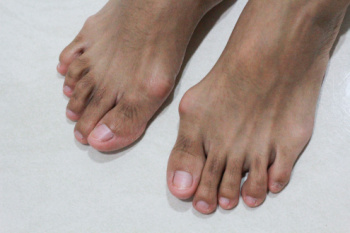
A bunion is a bony protrusion that forms at the base of the big toe, causing the toe to angle inward toward the other toes. This deformity can lead to pain, swelling, and difficulty finding comfortable footwear, and can significantly affect daily activities. The primary causes of bunions include genetics, wearing improper footwear, especially tight or high-heeled shoes, and certain foot structures. When the big toe is forced out of alignment, it places increased pressure on the joint, leading to inflammation and pain. Even after treatment, bunions can return if underlying factors, like shoe choice or foot mechanics, are not addressed. Treatment options include conservative measures like wearing supportive shoes and using custom orthotics to reduce pressure, as well as more invasive solutions like surgery for severe cases. If you have a bunion or are experiencing foot pain, it is suggested that you schedule an appointment with a podiatrist to discuss treatment options for relief, tailored to your needs.
If you are suffering from bunions, contact one of our podiatrists of Pocono Foot & Ankle Consultants. our doctors can provide the care you need to keep you pain-free and on your feet.
What Is a Bunion?
A bunion is formed of swollen tissue or an enlargement of boney growth, usually located at the base joint of the toe that connects to the foot. The swelling occurs due to the bones in the big toe shifting inward, which impacts the other toes of the foot. This causes the area around the base of the big toe to become inflamed and painful.
Why Do Bunions Form?
Genetics – Susceptibility to bunions are often hereditary
Stress on the feet – Poorly fitted and uncomfortable footwear that places stress on feet, such as heels, can worsen existing bunions
How Are Bunions Diagnosed?
Doctors often perform two tests – blood tests and x-rays – when trying to diagnose bunions, especially in the early stages of development. Blood tests help determine if the foot pain is being caused by something else, such as arthritis, while x-rays provide a clear picture of your bone structure to your doctor.
How Are Bunions Treated?
- Refrain from wearing heels or similar shoes that cause discomfort
- Select wider shoes that can provide more comfort and reduce pain
- Anti-inflammatory and pain management drugs
- Orthotics or foot inserts
- Surgery
If you have any questions, please feel free to contact our offices located in Stroudsburg, Nazareth, and Easton, PA . We offer the newest diagnostic and treatment technologies for all your foot care needs.
